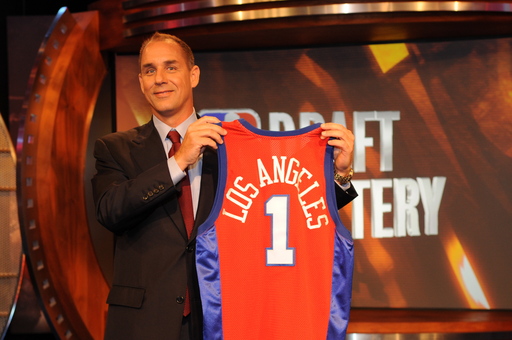The following article is a guest contribution by written by Evan Zepfel. Zepfel is a Portfolio Management Analyst at PAAMCO, is a graduate of Harvard College, was a member of Harvard’s Varsity Water Polo team and served a sports editor for The Harvard Crimson.

A number of high-profile potential investors have been linked to the sale of the Los Angeles Clippers, which could fetch as much as $1.5 billion for the Sterling family according to Chuck Baker of DLA Piper[1]. However, little mention has been made of the possibility of the transition to public ownership, which is more common among European sports franchises.
The NBA Constitution, which was released publicly in connection with the Sterling incident, does not explicitly prohibit public ownership of a team[2][3]. In fact, the only explicit prohibitions regarding ownership are those that relate to conflicts of interest[4]. The Constitution does, however, provide explicit regulations regarding the transfer of ownership from one person to another; specifically, that each of the potential owners is subject to scrutiny and approval by the league[5]. These regulations would need to be relaxed in order for public ownership to be practically feasible. It might be possible to circumvent these rules via a structure by which a fund purchases the team and investors are able to easily purchase shares in the fund.
The Clippers are especially attractive as they are the only major Los Angeles sports franchise that will be able to re-negotiate its TV contract within the next four years; expectations are that the team will be able to renegotiate a new deal that should provide a substantial and consistent cash flow for the team.
Typical arguments regarding the benefits of public ownership for professional sports franchises focus on the positives for the community. Public ownership of a professional sports team, however, could be a positive for the NBA as well. Public ownership allows fans to go above and beyond the typical levels of fan hood and better aligns interests between the team and its investor fans, as fan/investors are especially sensitive to the performance of the team. This could help teams gain concessions from local governments (e.g., many local shareholders who would benefit financially from a publicly financed stadium might be more likely to advocate and vote for such a proposal). Additionally, investors are more likely to watch the team on TV and purchase tickets to games (in order to monitor their investment), thus increasing team revenue via more valuable TV contracts and increased gate receipts.
To fulfill the NBA’s requirements regarding the forced sale (which is likely pending a vote by the NBA Board of Governors[6]), the Sterlings would be forced to offer their entire stake in the team in the IPO. According to Bloomberg, a number of recent IPO’s have offered somewhere between 5-10% of market cap at the IPO[7]; a similar offering for the Clippers would likely encompass a much larger percentage depending on the team’s specific ownership breakdown. Like any other public corporation, the shareholders would elect a board of directors that would then hire a staff to manage the day-to-day operations of the team, such that the vast majority of shareholders would not be able to exert significant control over the operations of the team. The fan/investors, however, should be able to influence the team’s elected management enough that they can govern the team’s specific purpose: either on-court success or profit-maximization. It is misalignment of these interests between owners and fans that causes much of the frustration evident in professional sports today.
The IPO would also present an interesting investment opportunity for a large group of investors, ranging from the typical retail investor to large institutional investors. Given the rapidly increasing valuations realized from sales of professional sports teams over the past few years, the Clippers could be a very profitable investment that would likely pique the interests of a broad range of investors. According to Nate Silver’s FiveThirtyEight blog, NBA teams on average have annualized a 9.2% rate of return over the past 10 years[8], while a broad index of large-cap US companies has annualized 5.4% over the same period[9]. The Clippers in particular are likely to realize a catalyst that should increase the team’s value substantially in the form of the new TV deal that the team can negotiate in the next few years. Similarly, the team’s recent on-court success and potential for future performance is likely to affect the team’s value to the upside. Analysis of NBA team valuations, however, is still a very inexact science, as there exists a dearth of appropriate comparisons due to the private ownership structure of other franchises.
While certain provisions in the NBA Constitution would make public ownership of the Clippers more difficult, the concept is not specifically prohibited, and would be an interesting ownership structure to consider given the expedited nature of the sale. The public ownership model has been used previously in the United States, and is successfully implemented with many of Europe’s top soccer clubs. Any discussion about the sale of the team by the Sterlings, whether forced by the NBA or not, would benefit from a discussion of the possibility of a public offering of the team.
[1] http://www.bloomberg.com/news/2014-05-27/bank-of-america-said-hired-by-sterlings-to-sell-nba-s-clippers.html
[2] http://mediacentral.nba.com/media/mediacentral/NBA-Constitution-and-By-Laws.pdf
[3] The NFL now explicitly prohibits public ownership, although the Green Bay Packers were ‘grandfathered in’ before the rule was approved.
[4] NBA Constitution, Article 3 § (a)-(d)
[5] NBA Constitution, Article 5 § (a)-(k)
[6] NBA Constitution, Article 13 § (a)-(j)
[7] http://www.bloomberg.com/news/2011-10-28/groupon-value-propped-up-with-lowest-internet-float-in-decade.html
[8] http://fivethirtyeight.com/features/got-a-billion-dollars-buy-the-clippers/
[9] S&P 500 Price return from Jan 1 2004-Dec 31 2013 (excluding reinvested dividends)
